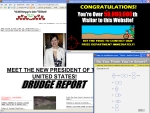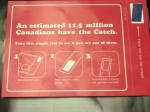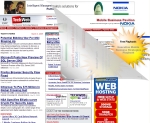One of the major reasons people use pop up blockers or switch to browsers like Firefox which have built in pop up blockers is to, no doubt, block pop ups. Serving pop ups is one thing. Ignoring people's preference to avoid them as a whole different animal. Companies that circumvent a consumer's choice to block pops by deploying anti-pop up/under blocking software are scum in our book. We use Firefox. Until recently, the past year and a half or so have been blissfully pop-free. A month or so ago, we have seen the resurgence of the pop while using Firefox. We don't like it.
Today, while visiting Dictionary.com, we were presented with a pop under. We forget the advertiser but we do know Advertising.com serves on-page banners to Dictionary.com. It's known that pop ups and unders do not always emanate from specific sites but from behavioral profiles built up over time so we aren't sure Dictionary.com or Advertising.com had anything to do with the pop.
Later today, while loathe to do so, we found it necessary to visit DrudgeReport. Sure enough, two pop unders appeared. This time, we paid more attention and saw that Tribal Fusion served the pop for Emode's Tickle. The other pop was one of those obnoxious flashing banners, this time, for travel site Travasaurus. We can't confirm who served that one but we sure like Drudge a lot less now that we did before.
Respect for peoples choice to opt out of seeing pop ads seems like a no brainer. It's sort of like answering "yes" to a waiter after he's asked if you're finished with your meal only to have him scrape what food might be left on the plate and jam it down your throat. It's just not a nice thing to do. Why is it so difficult for companies to grasp that concept? And we're not buying that whole argument that pops, like telemarketing work so they must be a OK. Times are changing. People aren't going to stand for this shit. Advertisers and sites should not stand for it either.
one of our Canadian readers sent us this magazine insert for Virgin mobile which asks readers to cut out a strip of paper from the insert and pee on in like a pregnancy test. As if anyone would actually do this is of no matter to Virgin Mobile. On the back of the insert, Virgin Mobile assumes the test was taken and asks, "Did you test positive for the Catch?" The "Catch," apparently, refers to competing cell phone provider's practice of tying discounts and promotions to loopholes or catches. The back of the insert lists symptoms of the "Catch" as "monthly billing discomfort, "unsightly hidden fees," irregular growth in rates" and "paralyzing contractual obligations." Of course, the offer close with Virgin Mobile's catch-free cell phone plan. We'll give it notice for being different. Larger images are here and here.
Leading the next great corporate marketing trend, desktop weather company WeatherBug has launched a weblog.
The goal of the weblog, it seems, is to address customer concerns and to offer insight into the weather gathering and weather reporting process. Since weather is high on everyone's daily news troll, a blog about the process might make sense.
Yesterday, we pointed to a video for Vegas Red Casino which showed a guy going to the doctor's office for his oversized right arm due to playing too many slots. Today, the second video, created by Keta Keta, illustrates playing the odds at Vegas Red Casino is much safer than playing the odds with a fan
Following the exit of General Mills Account Director Mike Burns and the 16 others who followed, Saatchi Worldwide has begun to rebuild naming Pete Johnson senior VP and creative director. In an unlikely scenario, General Mills is encouraging the group that left to at least speak with Saatchi about returning.
Obviously, there's deep secrets afoot here. Seventeen people don't up and leave without good reason. Not that anyone will do so, but we'd sure appreciate hearing little truth from anyone of those 17 former Saatchi staffers or others who have real facts surrounding the event.
If you are so inclined, we're happy to grant anonimity. Find us here.
In a move that might actually make rich media acceptable, CMP Media's TechWeb Network, yesterday, announced the launch of a new ad unit - the Dogear Peelback. The Dogear Peelback is an animated graphic that resembles a folded over page corner, or dogear. The ad unit, which sits quietly in the corner of the page until activated by mouseover, can be customized to include the client's logo or other creative. When a user 'mouses' over the dogear, the entire page peels back to reveal the advertiser's landing page behind the TechWeb Network news page. The effect gives advertisers a about half of the page real estate. View the demo here.
Once opened, the unit has the obligatory "Close" button on the outer most flap of the unit. Clicking "Close" or simply mousing off that area of the page, closed the unit. Making the unit more dynamic might call for the addition of an "Open" button which would continue to peel back that page until it opens entirely to the advertisers page. Currently, it seems, clicking on the uncovered page is the only method of navigating to the advertiser's page. Minor picks aside, the ad unit makes great use of rich media while maintaining sensibility to flashy, rich media crazy overload like those ads that crawl across the page while you fight to fund their "close" button. So far, it seems, this unit has great promise.
In a move likely to be sold as beneficial to commuters but, in reality, made to increase transit revenue, the Metropolitan Atlanta Rapid Transit Authority will pipe programming and advertising into each of its 230 rail cars. The cars will be outfitted with 15 inch flat screen monitors offering local news from ABC affiliate WSB and an FM transmitter providing top 40, jazz and R&B.
The system, provided by The Rail Network, is the first of its kind and is destined to cause both praise and consternation. The Rail Network CEO David Lane says Atlanta stands to take in $20 million in advertising revenue over the next decade and is in talks with all other major metro transit systems to spread the system across the country.
Lane expects Washington, D.C. and Vancouver, Canada to sign on soon.

|





